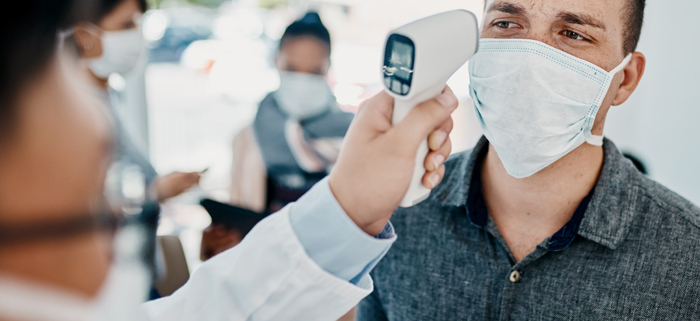Can I File for Worker’s Compensation if I Contract COVID-19?
If you have contracted COVID-19 at work, you might be contemplating whether you meet all requirements for workers’ compensation benefits.
The short answer is that it will likely be challenging to get these advantages in many states unless you are a medical services supplier or first responder who has treated a contaminated individual. The more extended answer is that it will rely upon your type of work, the conditions for your situation, and the laws in your state. In Tennessee, legislation to make COVID-19 an illness generally covered by COVID-19 failed. Another bill entitled SB8007b did pass, designating worker’s compensation in the event of a COVID-19 diagnosis for essential workers and any infected worker if nine or more other workers at the exact location have also become infected.
Worker’s Compensation Rules for Infectious Diseases Like COVID-19
For the most part, worker’s compensation covers illnesses that employees contract on account of their work. While typical seasonal illnesses like the flu are not viewed as work-related ailments, COVID-19 will be dealt with distinctively, depending on the state and circumstances.
Explicit qualification necessities for work-related infections shift from one state to another, yet, in all cases, you need to exhibit that:
- Your occupation caused your disease or put you at a higher risk of infection than the overall population
- You contracted the ailment because of a particular behavior taking care of your business
At the point when an infection becomes far-reaching locally, on account of the COVID pandemic, it tends to be especially hard to meet both of those prerequisites.
Missouri law states that it “doesn’t repay people since they are harmed or harmed while working. Work must be the overarching reason for why the individual contracted COVID-19.” Another expert states that “by far most of the COVID-19 cases will be ineffective because the illness is an overall danger to everybody around the world, independent of the business. People are presented to it both at work and wherever else.”
In a couple of states, you could qualify for worker’s compensation regardless of whether your work is significantly dangerous, as long as you have solid clinical proof of work environment openness. Furthermore, as discussed below, a few states have made it simpler for specific workers to meet all requirements for benefits when they get COVID-19 during the pandemic.
Conversely, different states like South Carolina preclude worker’s compensation inclusion when representatives contract an infectious illness from colleagues or when they would have been similarly exposed outside of work (S.C. Code § 42-11-10 (2020).
At the point when Your Job Puts You at High Risk of Coronavirus Exposure
First responders and medical services workers face a specific risk of being exposed to COVID-19, particularly amidst a pandemic. However, workers in different occupations—like correctional officers, transport drivers, and staple specialists—may likewise have the option to show that the idea of their work puts them at a higher risk for danger than the general population.
A few states have decided to grant worker’s compensation benefits to individuals in other fields of employment unless the business specifically demonstrated they did not catch COVID-19 at work.
For instance:
A New Jersey law assumes that COVID-19 is a business-related sickness unless a worker got the illness when working away from home during the general COVID crisis. To survive (or “disprove”) the assumption, the business should show that, almost certainly, the worker was not exposed to COVID at work. The law covers an expansive scope of workers, including anybody filling fundamental roles in the general population.
California, Minnesota, and Michigan give comparable assumptions to first responders and specific medical care workers. California likewise stretches out the premise to any representatives who get COVID-19 when their work environment has an episode of the sickness.
In Illinois, an impermanent measure applies a comparative assumption to some medical care workers and first responders, just as essential workers who connect with the overall population or possibly 15 co-workers. Notwithstanding, the Illinois law permits managers to refute the assumption by showing that they had completely carried out legitimate wellbeing and security measures.
Will Federal Employees Get Workers’ Comp Benefits for COVID-19?
The Division of Federal Employees’ Compensation (DFEC), part of the U.S. Division of Labor, created a new methodology for dealing with worker’s comp claims by government representatives who say they contracted COVID-19 while playing out their work obligations. Considering that it is so hard to know precisely when or how anybody gets this illness, DFEC clarified that it would consider worker’s compensation for specific government workers. Those at higher risk of disease like law enforcement, medical specialists on call, and others whose positions require continuous face-to-face connections with the general population. These exceptional cases will have their COVID worker’s compensation claims treated in a non-traditional way.
Assuming you document a case for COVID-19 as a high-risk government representative, DFEC will acknowledge that your occupation made you more susceptible to COVID. Even if your work is not viewed as a danger, you can also document your case. However, you will need to give proof regarding your exposure to the infection, alongside clinical evidence that business-related exercises straightforwardly caused or exacerbated your contraction of the illness.
Notwithstanding the government’s worker’s compensation framework, another administrative program, The Public Safety Officers’ Benefits Program, gives advantages to specific bureaucratic specialists who are forever and completely debilitated as an immediate aftereffect of a physical issue that occurred in the line of obligation. These “public wellbeing officials” incorporate firemen and cops who work for a public organization, just as individuals from approved rescue vehicle teams give crisis clinical benefits.
A government law sanctioned in August 2020, the “Protecting America’s First Responders Act,” makes it simpler for these specialists to get disability benefits when they contract COVID-19—and for their survivors to obtain death benefits, if the workers pass on, due to the sickness. The law assumes that COVID-19 was a physical issue supported in the line of duty, in case the representative was determined to have the infection during the 45-day time frame, after the specialist’s last day of work during 2020 and 2021 (P.L. 116-157 (S. 3607); 34 U.S.C. § 10281, 10284 (2020)).
Does Workers’ Comp Cover COVID Exposure Due to Workplace Conditions?
Imagine a scenario where you accept that you have been exposed to COVID-19, due to risky conditions at the workplace, rather than the idea of your occupation. For example, you may work at a transportation office or a meat handling plant that has not provided facial coverings or established social separating measures for representatives. Would you be able to get laborers’ comp benefits, assuming that you contracted COVID-19, after being exposed to a tainted associate?
Although laws have not resolved this inquiry straightforwardly, existing rules and court conclusions demonstrate that states might adopt shifting strategies. Under New Jersey law, laborers’ comp might cover work-related sicknesses that are substantially brought about by conditions specific to their work environment, notwithstanding their occupation exchange. What’s more, New Jersey courts have held that the debilitated representatives just need to show a plausible connection between the work environment conditions and the word-related sickness. (N.J. Details. § 34:15-31 (2020); Magaw v. Middletown Bd. of Educ., 731 A.2d 1196 (N.J. Sup. Ct. Application. 1999).)
In any case, courts in different states have held that representatives should show a connection between the unmistakable idea of their positions rather than conditions at a specific work environment (see, for instance, Demers v. St. Lawrence Psychiatric Center, 271 A.D.2d 857 (N.Y. Application. Div. 2000).
Investigating Your Options and Getting Help
Business owners and their insurance agencies will likely fight energetically against worker’s compensation claims for COVID-19—basically, for anybody other than representatives in especially high-risk occupations with evident proof that they have been exposed to a contaminated individual at work.
If you file a worker’s compensation case and are denied right away, it is probably a good idea to talk with an attorney. As the pandemic continues, worker’s compensation in this area constitutes rapidly changing case law. For further information, please call Logan-Thompson, P.C. at 423-476-2251 or check out their website at https://www.loganthompsonlaw.com.




Leave a Reply
Want to join the discussion?Feel free to contribute!